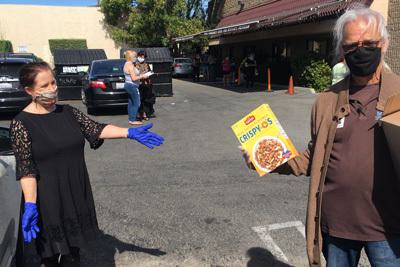It Feels Good to Give Back: Jewish Home Joins Effort to Feed Fellow Angelenos


It Feels Good to Give Back: Jewish Home Joins Effort to Feed Fellow Angelenos

The Los Angeles Jewish Home has always taken its responsibility of being a good neighbor and giving back to the larger community in a significant way. This partnership has been present in the 108-year history of the Jewish Home.
This is why we ourselves find it so gratifying to give back during this time of urgent need. For the past several weeks, the Jewish Home has been partnering with food banks and other community organizations in donating our surplus grocery items and meals.
The process of donating surplus food, however, began well before the COVID-19 pandemic hit.
In January of this year, Jewish Home CEO-President Molly Forrest asked Cindy Cordon, Director of Dietary Services at the Home, to explore the logistics of donating our surplus food to local charities that are feeding the less fortunate in our community.
Cordon explains that every two years the Home replenishes its emergency supplies. Often there are high-protein food items that are about to expire that need to be replaced with new items. Also, after a holiday there are holiday-specific items leftover.
All of these items, Cordon discovered, could be distributed to food banks and other nonprofits in the community. The Jewish Home’s Board of Directors approved the initiative to donate the surplus food, which they viewed as aligning with the Home’s core values.
Once she received the green light, Cordon began contacting local organizations she knew were in need of extra help.
An additional benefit, she says is that "the process of donating surplus food has made all of us look at how we can reutilize our food, in both kitchens and for all meals."
Occasionally Cordon finds herself with leftover meals, such as cold deli plates. "Sometimes we’ll have untouched plates because one of our residents chose an alternative meal, such as a tuna or egg salad," she says. Fortunately, she found a good match to receive those leftover meals, the Hollywood Food Coalition, which serves food and other services to those in need.
But what about those leftover grocery items? Turns out, Jewish Family Service of Los Angeles SOVA food pantry was delighted to receive the food donations. Cordon herself delivered canned goods, granola bars, instant Quaker oatmeal and a myriad of grocery items.
"So many households have lost their sources of income and find it impossible to meet all of their basic monthly expenses," says Fred Summers, Senior Director of Nutrition, Transportation, and SOVA programs at Jewish Family Service of Los Angeles. "Additional food supplies, like those from the Jewish Home, make a huge difference in our ability to meet the rising need."
For Cordon, developing relationships with food banks such as SOVA is a profound experience she knows will continue once the COVID-19 pandemic ends.
"It feels fantastic to be part of the solution!" Cordon says.